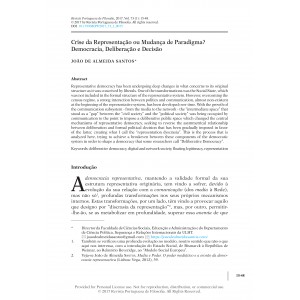Álvarez, Jesús Timoteo, Gestión del Poder Diluido. La construcción de la Sociedad Mediática. Madrid: Pearson, 2005.
Castells, Manuel, “Communication, power and counter-power in the network society”, in International Journal of Comunnication, n.º 1 (2007), 238-266. 1932-8036/20070238.
Cicerón, Quinto Tulio, Breviario de campaña electoral. Tradução de Alejandra de Riquer. Barcelona: Acantilado, 2009.
Debord, Guy, La société du spectacle. Paris: Gallimard, 1992.
Debord Guy, Commentaires sur la société du spectacle. Paris: Gallimard, 1992.
Godechot, Jacques (Org.), Les Constitutions de la France depuis 1789. Paris: Garnier Flammarion, 1995.
Habermas, Juergen, Theorie des kommunikativen Handelns. Frankfurt-am-Main: Suhrkamp, 1981.
Habermas, Juergen, Storia e critica dell’opinione pubblica. Tradução de Augusto Illuminati, Ferruccio Masini e Wanda Perretta. Roma-Bari: Laterza, 2002.
Habermas, Juergen, Faktizitaet und Geltung. Beitraege zur Discurstheorie des Rechts und des democratischen Rechtsstaats. Frankfurt-am-Main: Suhrkamp, 1992.
Katz, Elihu, “One hundred years of the communication research”, in As Ciências da Comunicação na Viragem do Século. Actas do I Congresso da associação Portuguesa de Ciências da Comunicação, ed. José Bragança de Miranda e Joel FRederico da Silveira. Lisboa: Vega, 2002.
Lippmann, Walter, Public Opinion. New Brunswick: Transaction Publishers, 1998.
Maîstre, Joseph de, Considerazioni sulla Francia. Tradução de Massimo Boffa. Roma: Riuniti, 1985.
Manin, Bernard, Principes du Gouvernement Représentatif. Paris: Flammarion, 1996.
Mannheim, Karl, Essays on sociology and social psychology. London: Routledge, 1969.
Marx, Karl. Zur Judenfrage, in Marx-Engels Werke I. Berlin: Dietz Verlag, 1981, 347-377.
Marx, Karl, Kritik des Hegelschen Staatsrechts, in Marx-Engels Werke I. Berlin: Dietz Verlag, 1981, 203-333.
Mazzarino, Breviario dei politici secondo il Cardinale Mazzarino. A cura di Giovanni Macchia. Milano: Rizzoli, 1981.
Michels, Robert, Para uma sociologia dos partidos políticos na democracia moderna. Tradução de José M. Justo. Lisboa: Antígona, 2001.
Minc, Alain, L’Ivresse Démocratique. Paris: Gallimard, 1995.
Ruffìa, Paolo Biscaretti di, Costituzioni Straniere Contemporanee. Milano: Giuffré, 1985.
Santos, João de Almeida, Breviário Político-Filosófico. Lisboa: Fenda, 1999.
Santos, João de Almeida, Os Intelectuais e o Poder. Lisboa: Fenda, 1999.
Santos, João de Almeida Santos, “O espaço intermédio” (Março de 2010), joaodealmeidasantos.blogspot.com (Ensaios).
Santos, João de Almeida, Media e Poder. O poder mediático e a erosão da democracia representativa. Lisboa: Vega, 2012.
Santos, João de Almeida, “A política e a Rede: os casos italiano e chinês” (Novembro de 2013), joaodealmeidasantos.com (Ensaios).
Santos, João de Almeida, “Política, Sociedade e Tecnologias da informação” (Junho de 2015), joaodealmeidasantos.com (Ensaios).
Schmitt, Carl, Le categorie del político. Saggi di teoria política. Tradução de Pierangelo Schiera. Bologna: Il Mulino, 1972, 87-165.
Schumpeter, Joseph Capitalisme, Socialisme et Démocratie. Tradução de Gael Fain. Paris: Payot, 1974.
Streeck, Wolfgang, Tempo Comprado. Tradução de Marian Toldy e Teresa Toldy. Lisboa: Actual, 2013.
Tarde, Gabriel, L’opinion et la foule. Paris: PUF, 1989.
Tocqueville, Alexis de, Da democracia na América. Tradução de Carlos de Oliveira. S. João do Estoril: Principia, 2001.
Urbinati, Nadia, “Che cosa intendiamo quando parliamo di crisi della democracia”. IL Mulino 6/16, n.º 488 (2016): 982-990.
Wolf, Mauro, Gli effetti sociali dei media. Milano: Bompiani, 1997.









